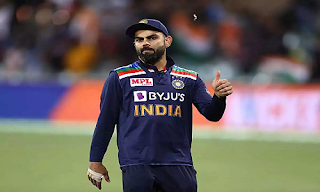Kohli’s decision to retain (बरक़रार रखना; to keep or continue to have something) ODI captaincy while relinquishing (त्यागना; to give up something such as a responsibility) T20I leadership is strange
Captains have a shelf-life (जीवनावधि; the length of time that something remains useful, popular, or successful) and the player usually outlasts (अधिक चलना; to live or exist, longer than someone or something) the leader within the individual. This is true across sport and more so in cricket, with its three distinct formats and the attendant pressures.
Seen through that prism (किसी खास दृष्टिकोण से देखा जाना; someone/something, intended to deceive you, and to understand the truth about the situation), it is remarkable that Virat Kohli has had such a long run at the helm (नियंत्रण में; in the position of being in control of something) since his appointment as Test captain following M.S. Dhoni’s retirement from the longest format on December 30, 2014.
Since that day in Melbourne, Kohli, both batsman-supreme and aggressive-captain (सर्वोच्च-बल्लेबाज और आक्रामक कप्तान; the best batsman and competitive captain), has striven hard (कड़ी मेहनत; to try very hard to do something or to make something happen) for success and balance. Subsequently (तत्पश्चात्; after something else), Kohli also held the reins (बागडोर संभालना; to control something very carefully) in One Day Internationals and Twenty20Is from early 2017.
He got prolific runs (बहुसर्जक दौड़/अंक; producing a great number or amount of runs) be it in Test whites or in the blue shade (indicates test cricket/match) and he savoured triumphs (जीत का स्वाद लेना; taking pleasure of victory/success) with his men even if ICC silverware (चाँदी की ट्रॉफी; silver trophy) in limited-overs cricket or in the World Test Championship proved elusive (मायावी/हाथ न आना; to not be caught by someone).
He also leads Royal Challengers Bangalore in the Indian Premier League (IPL), which resumes in the United Arab Emirates (UAE) on Sunday. Be it finalising playing elevens, evolving strategies (रणनीतियां बनाना/विकसित करना; to change or develop plans for achieving a goal), having a word with the selectors or addressing the media, captaincy throws up manifold challenges (अनेक चुनौतियाँ; many and of several different types of challenges).
The pressure was immense, and Kohli took to social media and announced that he will step down (पद/स्थान छोड़ना; to give up a job or position) from captaincy in T20Is after the ICC Twenty20 World Cup concludes in the UAE this November.
Over the last few months, there was chatter (बकबक/बकझक; conversation about things that are not important) about the Indian team’s captaincy sweepstakes (बाज़ी/दाँव लगाना; a race or gambling game in which the winnings comprise all the money that has been staked). And Kohli’s move was not entirely a surprise but what remains piquant (दिलचस्प; interesting and exciting, especially because of being mysterious) is that he has not relinquished captaincy in ODIs.
Perhaps the 2023 ICC World Cup in India is too massive (बड़े पैमाने पर; very large in size, amount, or number) a brand for Kohli to ignore. Yet, it leaves his successor (उत्तराधिकारी; someone or something that comes after another person or thing) in T20Is, most likely Rohit Sharma, in an awkward position.
Captaincy is usually split between red-ball (test matches) and white-ball (T20 and ODI matches) cricket but with Kohli preferring this nuanced choice (सूक्ष्म विकल्प; slightly different choice) of both Test and ODI leadership, he is only leaving the crumbs (टुकड़ों; a very small piece) for the imminent captain (
निकटस्थ/होने वाला कप्तान; coming or likely to be captain very soon) in T20Is.
It is a fact that Rohit has led Mumbai Indians well in the IPL, guiding them to five titles. His relaxed demeanour (सुकून भरा व्यवहार; a calm way of looking and behaving) is in contrast to Kohli’s in-your-face aggression, but Rohit gets the work done, both as batsman and leader.
With his credentials as Test opener gaining a fresh glow in England, the Mumbaikar, always a splendid batsman (शानदार बल्लेबाज़; impressive batsman) in limited-overs cricket, has grown in stature (महत्ता/रूतबा; the good reputation a person or organization).
At 34, Rohit is nearly two years older to Kohli, but for now he is primed (शानदार; most active or successful) for guiding the transition (परिवर्तन; the process of changing from one system or method to another) and has seemingly edged past () the other candidate Ajinkya Rahane in Tests.
But that will happen only if Kohli decides to remain a pure batsman or the selectors intervene (हस्तक्षेप करना; to become involved in a situation to change it or improve it). For now, a change, however feeble (कमज़ोर; weak and without energy, strength, or power), has begun in T20Is.
Thank
you for reading it complete, You can now make your own English
vocabulary list for revision and/or also visit us daily to revise the
Hindu daily vocabulary.

Comments
Post a Comment